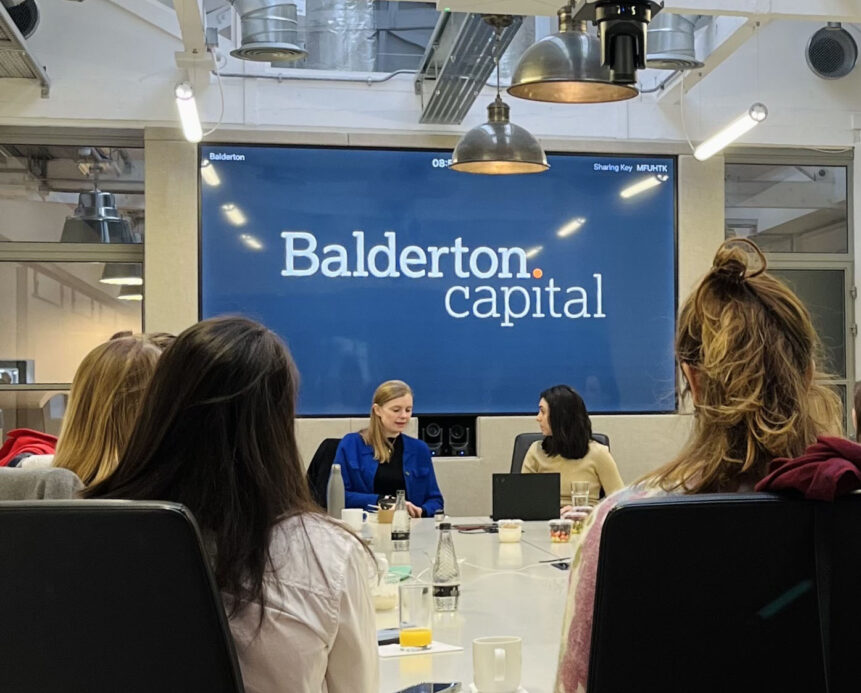- Portfolio News
- 15 July, 2024

For our most recent Women in VC Breakfast, we were joined by Check Warner, General Partner at Ada Ventures, co-founder of Diversity VC, and recent recipient of an MBE for services to equality and diversity in the venture capital sector.
Many thanks to Check for coming along and sharing her insights and experience with the group in such a dynamic and wide reaching discussion. Highlights included:
Venture’s privilege problem
Following a stint in advertising on a graduate scheme at AMV BBDO, Check’s career in venture began at London-based seed fund Downing Ventures. It was there that she saw that many VCs from across the industries shared the same ethnicity, gender, schooling, circle of close relationships and how this affinity bias was leading to investing in founders from similar backgrounds.
Fairness is a really strong value for me, and I thought, this has to change. This is just not fair. So that’s what led me to co-founding Diversity VC with a group of other passionate people- including a group of Balderton folk – Suranga Chandratillake, Ben Goldsmith and Anna Huyghues-Despointes, to create something that would hopefully spark real change.
Check Warner General Partner, Ada Ventures
Check points out that entrepreneurship is about taking risks – but the truth is, taking big risks is only possible for those who have a level of security. If you’ve got young kids at home, or are caring for an elderly parent, or are struggling to pay your bills, you are not in a position to take the big swings that VCs often urge founders to take and ‘put it all on red’ for your business.Check’s view is that we need to be aware of this reality as an industry, and there’s a huge amount more work to be done. Get started with:
- Inclusive sourcing: Ensure you have unique and diverse deal flow sources – that could include a broad set of angels or pre-seed funds that proactively seek out founders from diverse backgrounds – meaning age, race, gender, socio-economic background. Ensure you are tracking your pipeline and adjusting your activities accordingly. The Ada Ventures pipeline of investment opportunities is 50% female led as a result of inclusive sourcing activities.
- Fair decision-making: The Ada Ventures team have designed several changes to the typical investment process to ensure the decision-making process is as fair as possible. For example, asking the same questions for all founders when assessing them, pre-defining what an “outlier” founder is amongst the team, mitigating individual biases and ensuring you use the same grading criteria or scoresheet.
- Inclusion training: Check recommends engaging with experts to run training on topics such as inclusion and equity.
Bridging the confidence gap
Venture remains an incredibly competitive industry. It’s easy to feel judged – by your peers, by founders, by LPs – and that sense of comparison can be difficult to navigate, and often felt more strongly by those from underrepresented backgrounds.Check herself recalls feeling like an outsider at networking events, and being encouraged to stick with the safer path by staying in advertising, despite her determination to build something for herself in venture.
I share this for anyone who’s ever felt like they don’t fit in or they’re not supposed to be in this industry, which I think is a feeling that compounds – particularly if you have any kind of difference to the historical profile of a venture capitalist.
Check Warner General Partner, Ada Ventures
This ‘confidence gap’ is something Check feels strongly about, and is actively working on with portfolio founders. She shared some great advice with the group:
- Start small. You don’t have to come up with this finished product that is perfect from day one. Just do one tiny thing to get started. Spend one minute on it every day, and you’ll start to get there. That’s how confidence slowly builds – in those moments where you look back at what you’ve accomplished and see that you can do so much more.
- Work with and for people who inspire you. Role models are important. But mentoring should be a two-way relationship. Rather than just reaching out cold and asking someone to give you their time as a mentor, try to find ways to work together that would bring them value too.
- Pay it forward. Ask yourself what you can do to open doors for other people who are just embarking on their careers. Build confidence in others by showing them you believe in them.
Confidence is a big reason why entrepreneurs are held back. Actually I even see it in my portfolio – they’re so qualified, so knowledgeable, so good. And yet, those entrepreneurs from diverse backgrounds are more hesitant to take those big bets that they need to take to get to the next level.
Check Warner General Partner, Ada Ventures
Raising your own fund
Check & Matt set up Ada Ventures in mid-2018 and fundraised for 18 months. Eventually after hundreds of meetings, Ada Ventures was born, and the first fund closed at £38 million at the end of 2019 – right before the pandemic hit.While Check’s fundraising experience had its ups and downs, she acknowledges the layers of privilege at play – something you can read more about on her medium post. Few people have the opportunity to raise their own fund.Check’s top tips for raising a fund include:
- Be patient. This is the biggest lesson Check learned on her journey founding Ada Ventures. Good things take time, and patience is important in VC.
- Start planning your strategy years before you plan to raise the fund. Write your own pitch deck and make sure that your track record today is consistent with what you want to do. Understand your strengths and potential weaknesses vs the other funds in the market.
- Build relationships with LPs. LPs tend to be a little outside of the VC ecosystem, so they really value those inside relationships. Find associate-level LPs (for example via LinkedIn), reach out and get to know them. Chances are, in a few years time they may be the ones making the decisions about who to allocate capital to.
As venture investors, we are stewards of large amounts of institutional capital and we have a unique opportunity to collectively change both the tech and VC industry. It might seem daunting, but it’s all about taking that first step. Let’s start small and challenge the status quo!














